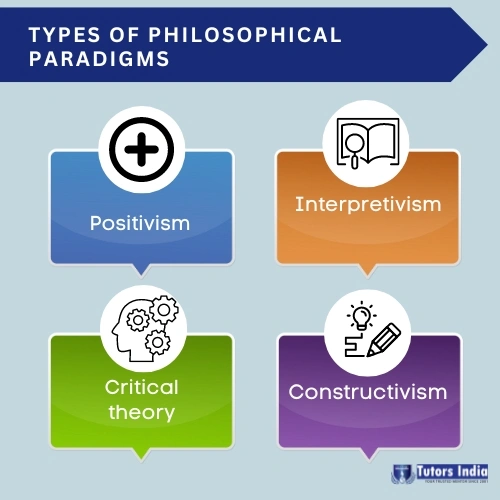Different Philosophical Paradigms Used in a Dissertation Research Methodology
Different Philosophical Paradigms Used in a Dissertation Research Methodology
What is a research methodology?
- Research methodology involves collecting, analysing and interpreting the data collected during research.
- The primary intent of a research methodology is to explain the what, why and how of research to answer the research questions. A dissertation research methodology helps bring credibility to the dissertation.
- Research methodology is often based on the understanding of the research gaps that are identified from a literature review. This understanding often gives rise to assumptions to guide the research, known as philosophical paradigms.
What are philosophical paradigms in research?
- Philosophical paradigms are underlying assumptions and views that influence every stage of research methodology, such as dissertation topic selection, data collection, and statistical analysis
- They are the fundamental and theoretical viewpoints that determine how researchers conduct research and interpret their findings.
- Different types of philosophical paradigms exist that guide the research methodology and approaches to research methodology.
Types of Philosophical paradigm
There are several types of philosophical paradigms in research that includes positivism, interpretivism, critical theory, and constructivism. Each of these paradigms is based on its own set of assumptions and ideas about the nature of reality, the role of the researcher and their connection with the research participants. The choice of a philosophical paradigm depends on the research question, objectives, and nature of the dissertation topic.

- Positivism: Positivism is based on the philosophical attitude of natural scientists who work with observable reality within society to generate generalisations. Positivism refers to the importance of what is given in general, with a more stringent focus on considering pure data and facts without being impacted by human interpretation or bias. The positivism research paradigm prioritises objectivity and quantitative research methods to study observable phenomena. It is based on the assumption that a single reality can be observed and measured and that knowledge can be obtained using scientific procedures. For instance, the researcher would see an organisation or other relevant social elements as real, just as he would regard physical objects and natural occurrences.
- Interpretivism: The concept of interpretivism evolved from critiquing the positivism research paradigm. Interpretivism is a philosophical paradigm that emphasises subjectivity and uses qualitative methods to study social phenomena. Interpretivism is more concerned with in-depth variables and aspects associated with a context; it regards humans as distinct from physical phenomena in that they provide greater depth in meanings on the belief that humans cannot be investigated in the same manner that physical phenomena can. It assumes that people interpret the world differently and that knowledge can be gained through understanding people’s experiences, attitudes, and beliefs (Alharahsheh, 2020).
- Critical theory: Critical theory is a philosophical paradigm that prioritises social justice and studies power interactions and social systems utilising qualitative methods. It takes the view that social inequality and oppression are ingrained in society and that science can be utilised to question and reform these institutions.
- Constructivism: Constructivism is a philosophical paradigm that emphasises the role of the researcher in building knowledge through research methodology. It is assumed that knowledge is gained by the interaction between the researcher and the study participants and that the researcher’s notions and opinions might impact the research outcomes (Aflisia, N., 2021).
Importance of philosophical paradigms in guiding research methodology
Choosing a philosophical paradigm is important because it guides the research methodology and approach. Different paradigms require different research methods and techniques and can lead to different conclusions about the research topic. A researcher using a positivist paradigm, for example, would concentrate on quantitative data collecting and statistical analysis. A researcher using an interpretative paradigm, on the other hand, would concentrate on qualitative data collection and interpretation.
Check out our study guide for more guidance on choosing an appropriate research methodology.
Choosing the proper philosophical paradigm is essential for conducting robust and relevant research. Failure to choose an appropriate paradigm can result in research that is neither rigorous, coherent, nor meaningful. When choosing a philosophical paradigm, researchers must carefully analyse their research questions and aims and the nature of the dissertation topic.
Conclusion
Research methodology involves collecting, analysing and interpreting the data collected during research. Research methodology is often based on the understanding of the research gaps that are identified from a literature review. This understanding often gives rise to assumptions to guide the research, known as philosophical paradigms. Positivism, Interpretivism, Critical Theory and Constructivism are the types of philosophical paradigms in research. Choosing a relevant philosophical paradigm helps guide research to obtain results that help answer the research question.
We have offered dissertation help to Master’s students since 2001. We are a team of experts from renowned universities experienced in academic writing and research who understand the challenges faced by Master’s students. We comply with the university guidelines, assist students in choosing a dissertation topic, conduct research and statistical analysis, and offer publication support. For students specialising in engineering and technology, we help them with coding and algorithms and ensure the assistance offered is error- and plagiarism-free.
References
Alharahsheh, H. H., & Pius, A. (2020). A review of key paradigms: Positivism VS interpretivism. Global Academic Journal of Humanities and Social Sciences, 2(3), 39-43.
Aflisia, N., Hendrianto, H., Nasir, N. F., & Haryanti, E. (2021). Critical Theory and Constructivism in the Perspective of Islamic Epistemology. NALAR: Jurnal Peradaban dan Pemikiran Islam, 5(2), 109-120.

 Previous Post
Previous Post